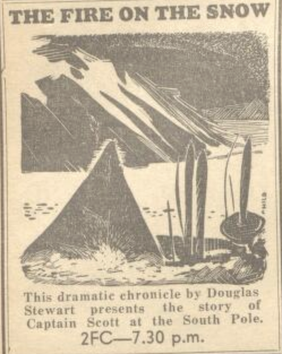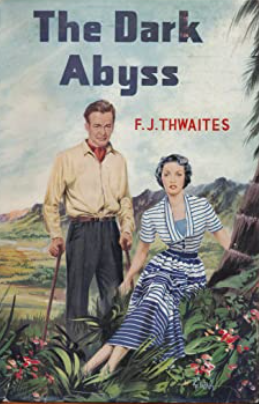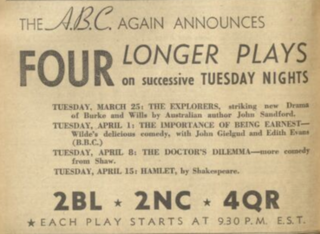Radio adaptation

The play was adapted by the ABC for radio in 1955, [3] 1956, [4] 1959 [5] and 1962. [6]
Reviewing the 1955 radio production, The Age called it a "connected and believable story... a nice piece of work". [7]
| The Illusionists | |
|---|---|
| Written by | Morris West |
| Date premiered | 1955 |
| Place premiered | ABC radio |
| Original language | English |
| Subject | modern life |
| Genre | verse drama |
The Illusionists is a 1955 stage play by Morris West about an advertising agent who longs to paint. It was a verse drama, like his later play The Heretic. [1]
The play was highly commended in the 1955 playwriting competition from the Playwrights' Advisory Board that was won by Summer of the Seventeenth Doll and The Torrents. [2]
A commercial artist leaves his job working for an advertising agency and wife and child to do his own work.

The play was adapted by the ABC for radio in 1955, [3] 1956, [4] 1959 [5] and 1962. [6]
Reviewing the 1955 radio production, The Age called it a "connected and believable story... a nice piece of work". [7]
The play was presented at the Theatre in the Round in London in June 1957 starring Bruce Stewart and directed by Leila Blake.
The Daily Telegraph said "neither the novelty of the setting nor the blank verse - some of it rather purple - could disguise that there was practically nothing new to be said." [8]

The Fire on the Snow is a 1941 Australian verse play by Douglas Stewart about the Terra Nova Expedition to Antarctica by Robert Falcon Scott. It premiered on ABC radio on 6 June 1941 to great acclaim and inspired a series of Australian verse dramas on ABC radio.

Lady in Danger was a play by Australian writer Max Afford. It was one of the few Australian plays to be produced on Broadway. It was also adapted for radio and television.

The Dark Abyss is a 1951 novel. It is about Captain Saunders who is injured in the Korean War then falls in love with Dr Balant.
Ned Kelly is a 1942 radio play by Douglas Stewart about the outlaw Ned Kelly.
James Workman was a Scottish-born actor and writer who mostly worked in Australia.
The Highwayman is an Australian musical comedy with book, music and lyrics by Edmond Samuels. Set in Bendigo during the Gold Rush in the 1860s, the story concerns the love of an innkeeper's daughter for a highwayman.
Margaret Catchpole is a 1945 Australian radio drama by Rex Rienits about Margaret Catchpole. It was one of several dramatisations of Australian historical figures by Rienits.
Awake My Love is a 1947 Australian stage play by Max Afford.
Red Sky at Morning is a 1935 Australian stage play by Dymphna Cusack. The play helped launch Cusack's writing career and was filmed in 1943.

An Antarctic Epic is a 1933 Australian radio drama by Edmund Barclay about the Scott Expedition to Antarctica. It was the first radio drama script by Barclay who went on to become arguably Australia's leading radio writer.

A Rum Affair is a 1940 Australian radio play by Alec Coppel.

The Explorers is a 1952 Australian radio play about the Burke and Wills expedition by John Sandford. It was Sandford's first play.
Henry Lawson Stories was a name given to a series of 1937 Australian radio plays on the ABC where Edmund Barclay adapted stories of Henry Lawson.
The Earthquake Shakes the Land is an Australian radio play in verse by Douglas Stewart. It concerns the Invasion of the Waikato in the New Zealand Wars. It was a companion piece to Stewart's The Golden Lover.
The Golden Lover is a 1943 Australian verse drama by Douglas Stewart. It was based on an ancient Māori legend. Stewart was from New Zealand.
Point of Return is a British television play by M.B. Kingsland. Written for television, it originally aired on British television in 1957 and was produced on Australian television in 1958. It was Kingsland's first script.
Last Trip is a 1956 Australian radio play by William Jenner. It aired as part of a special week of Australian plays on the ABC scheduled by Leslie Rees. Jenner was a former sailor who had previously written Deserter for the ABC.
Gulliver's Cousin is a 1954 Australian radio play by Ruth Park about William Dampier.
The Shades Will Not Vanish is a 1952 Australian novel by Helen Fowler. It was her first novel.
The Medea of Euripides is a 1954 Austraslian radio play by Ray Mathew. It was his adaptation of Medea by Euripides.